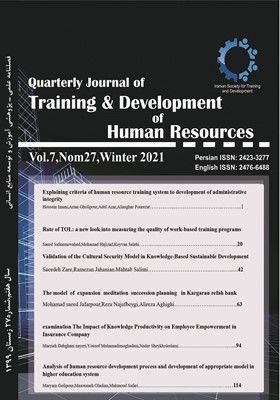Validation of the Cultural Security Model in Knowledge-Based Sustainable Development
Subject Areas : رویکرد ها ومدل های ظرفیت سازی منابع انسانیSaeide Zare 1 , ramezan jahanian 2 * , mahtab salimi 3
1 - Karaj University
2 - Azad University
3 - Azad University
Keywords: ValidationCultural Security Sustainable Development KnowledgeFactors,
Abstract :
This research validates the model of cultural security in sustainable knowledge-based development. The research method is applied in terms of purpose and descriptive-survey in terms of data collection method and mixed (quantitative-qualitative) in terms of the type of data. The statistical population in the qualitative section (interview section) comprised 15 experts and specialists familiar with cultural and scientific issues in the Ministry of Science, Research and Technology, who were selected by purposive sampling. The statistical population in the quantitative part included 551 experts and managers of the Ministry of Science, Research and Technology in 2019-20, from among whom, some 226 persons were selected by stratified random sampling. Both library research and field observation methods were employed for data collection. In the field observation method, in order to collect the qualitative part, interviews were conducted with a number of mangers enaged in cultural affairs, and in the quantitative part, the data was collected through a researcher-made questionnaire. The reliability of this questionnaire was estimated based on 0.86 Cronbach's alpha coefficient. Confirmatory factor analysis was used in relation to the validity of the obtained indices and also a questionnaire was designed to assess the validity of the model, which measured the dimensions of the final model using a single sample t-test. The results showed that the model was valid and the model of cultural security in the knowledge-based sustainable development gained the required validity with cultural, economic, social, environmental, political as well as national and religious factors.
1. عبداله خانی، علی، فرهنگ استراتژیک، تهران: موسسه فرهنگی مطالعات و تحقیقات بین المللی ابرار معاصر ،1397
2. خسروی، مرتضی، (1394) امنیت در قرآن؛ رویکردی تفسیری تبیینی، چاپ اول، انتشارات دانشگاه دفاع ملی.
3. محرمی, توحید. (1397). آینده امنیت فرهنگی جمهوری اسلامی و تحقق تمدن نوین اسلامی. مطالعات بنیادین تمدن نوین اسلامی،1(1)، 65-89.
4. کریمی مله، علی؛ بابایی، اکبر، (1390) امنیت ملی از منظر امام خمینی (ره) تهران، چاپ دوم، پژوهشکده مطالعات راهبردی.
5. صالحی امیری، سید رضا و افشاری نادری، افسر. مبانی نظری و راهبردی مدیریت ارتقای امنیت اجتماعی و فرهنگی در تهران، راهبرد تابستان 1390 شماره 59
6. منصوری، محمد جواد(۱۳۹۵). تهدیدات فرهنگی و راهکارهای تحقق امنیت فرهنگی در اندیشه امام خمینی (ره)، پایان نامه برای دریافت درجه کارشناسی ارشد در رشته اندیشه سیاسی در اسلام
7. امیری محمدرضا، ضیایی ثریا، شریف مقدم هادی، فیاضی بیبی مرجان. (1397). طراحی الگوی فرهنگ سازمانی اثربخش در کتابخانههای عمومی ایران. تحقيقات اطلاعرساني و كتابخانههاي عمومي. ۲۴ (۴): ۵۰۱-۵۲۱.
8. تقوایی یزدی, مریم. (1397). ارایه مدل ابعاد آموزشی و پژوهشی مراکز رشد و تأثیر آن بر توسعه پایدار دانشگاهها. مطالعات برنامه ریزی آموزشی 7(14), 146-171.
9. ثنایی¬پور، فاطمه؛ قرونه، داوود. (1395). نقش مراکز رشد علم و فناوری دانشگاهی در رشد شرکت¬های جدید فناورانه محور، چهارمین همایش تعامل صنعت و دانشگاه با رویکرد بهبود کسب و کار.
10. Pourkasmaei, M., Fallahi G. R., Nikmanesh, S. & Aghataghi, M. (2013) "Family structure and sense of security”, Advances in Applied Science Research, Vol 4(3):374-379.
11. Mincong Tang, Meng’gang Li, Tao Zhang. The impacts of organizational culture on information security
12. Nishiumi, M. (2013). Sustainable development and culture. ChuoOnline,7 Feb.Retrieved March 21, 2017, from http://www.yomiuri.co.jp/adv/chuo/dy/research/20130207.htm.

